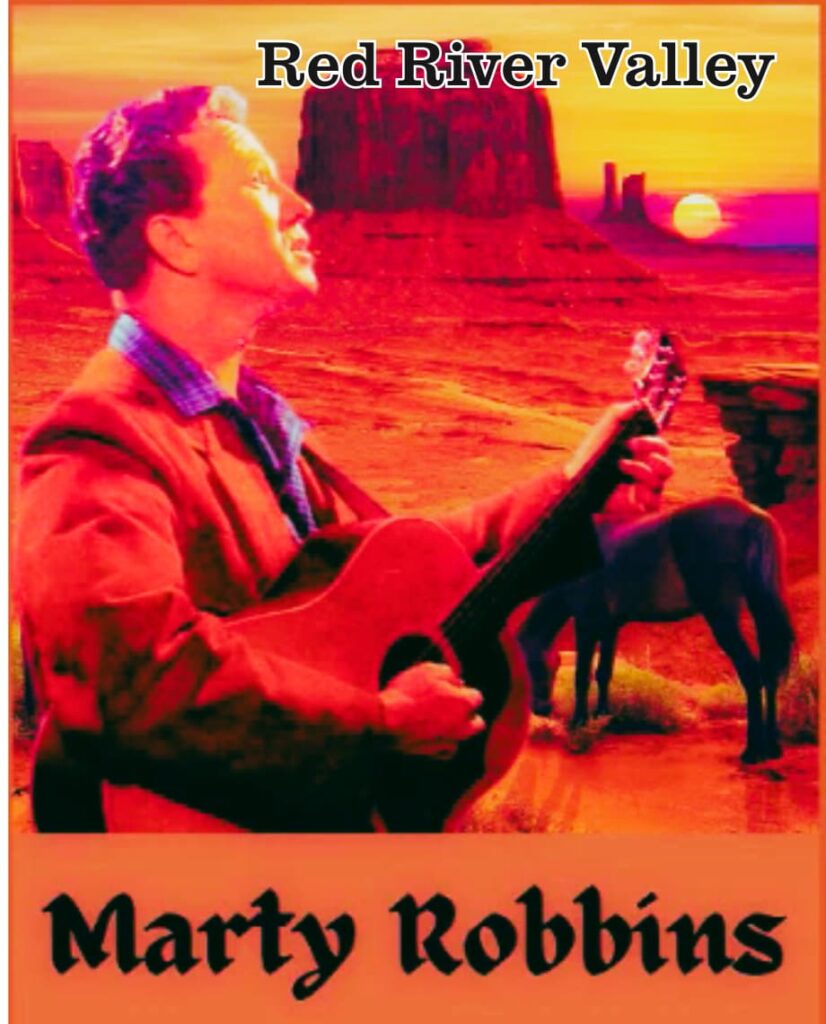
A Timeless Echo of the American West: Love, Loss, and the Enduring Spirit of the Frontier
Ah, Marty Robbins. Just hearing that name conjures up images of wide-open spaces, dusty trails, and the plaintive cry of a lonesome cowboy. He was more than just a country singer; he was a storyteller, a minstrel of the American West, and his voice had a way of cutting straight to the heart of things. When he sang, you didn’t just hear words and music; you felt the sun on your face, the grit of the earth beneath your boots, and the ache of longing that seems to reside in the very soul of the frontier.
Today, we’re going to talk about a song that, while not one of his most prominent chart-toppers like “El Paso” or “Singing the Blues,” holds a special place in the canon of American folk music and, indeed, in the hearts of many. I’m speaking, of course, of “Red River Valley.” Now, it’s important to note that “Red River Valley” isn’t a Marty Robbins original. It’s an old, old folk song, a true evergreen, whose roots stretch back into the hazy mists of the 19th century. Because of its traditional nature, it didn’t have a single “chart position” at the time of its initial “release” in the way a modern pop song would. However, Marty Robbins included his rendition on his 1961 album, “More Greatest Hits,” which was a follow-up to his massively successful 1959 album, “Gunfighter Ballads and Trail Songs.” While “More Greatest Hits” itself didn’t have a specific chart peak that’s easily identified for “Red River Valley” as a single, the album continued to showcase his prowess as a purveyor of Western-themed songs, building on the success that saw “Gunfighter Ballads and Trail Songs” reach number 6 on the Billboard 200 and achieve platinum status. His interpretation undoubtedly contributed to its enduring popularity and solidified its association with the romanticized image of the cowboy.
The story behind “Red River Valley” is as winding and elusive as the rivers it describes. There’s no single author, no definitive moment of creation. Folklorists and historians have debated its origins for generations, with theories ranging from a Canadian genesis in the 1870s – perhaps tied to the Red River Rebellion in Manitoba, depicting the sorrow of a Métis woman whose soldier lover is departing – to an American birth in the mid-1800s, deeply ingrained in the cowboy and pioneer experience of the Red River of the South, which snakes through Texas, Oklahoma, and Louisiana. Regardless of its exact birthplace, the song traveled, evolving and adapting with each voice that sang it, each campfire it echoed around, and each generation that embraced its simple, yet profound, message. It truly belongs to the people, passed down through oral tradition long before it ever saw a published sheet of music in 1896 under titles like “In the Bright Mohawk Valley.”
The meaning of “Red River Valley” is, at its core, a poignant lament of parting and a desperate plea for remembrance. It speaks of a love left behind, of the bittersweet ache of a farewell that feels too soon, too final. “From this valley they say you are going,” the lyrics begin, painting a picture of impending separation. The singer implores their departing beloved, “Come and sit by my side if you love me, Do not hasten to bid me adieu, Just remember the Red River Valley, And the cowboy who loved you so true.” It’s a universal theme, really, this fear of being forgotten, this longing for a love that transcends distance and time. For many, it evokes the loneliness of the frontier, the transient nature of life on the range, where connections were often forged quickly and broken just as swiftly by the demands of the open road or the call of new horizons. It’s a song that captures that melancholic beauty of the American West, where vastness and solitude often intertwined with moments of intense human connection.
For those of us who grew up with these songs, Marty Robbins’ version of “Red River Valley” is more than just a recording; it’s a doorway to a bygone era. His smooth, earnest baritone lends a timeless authenticity to the lyrics, transforming what could be a simple folk tune into a heartfelt ballad. You can almost feel the dust motes dancing in the sunlight, hear the gentle rustle of the prairie grass, and taste the bittersweet tears of a farewell. It’s the kind of song that makes you want to pull up a chair, gaze out at a distant horizon, and remember. Remember simpler times, perhaps, or loves that have come and gone, leaving their indelible mark on the landscape of our own lives. It’s a testament to the enduring power of folk music and to artists like Marty Robbins who, with their profound understanding of the human heart, ensured these timeless melodies continued to resonate through the decades, connecting us to a shared past and to the universal experiences of love and loss.